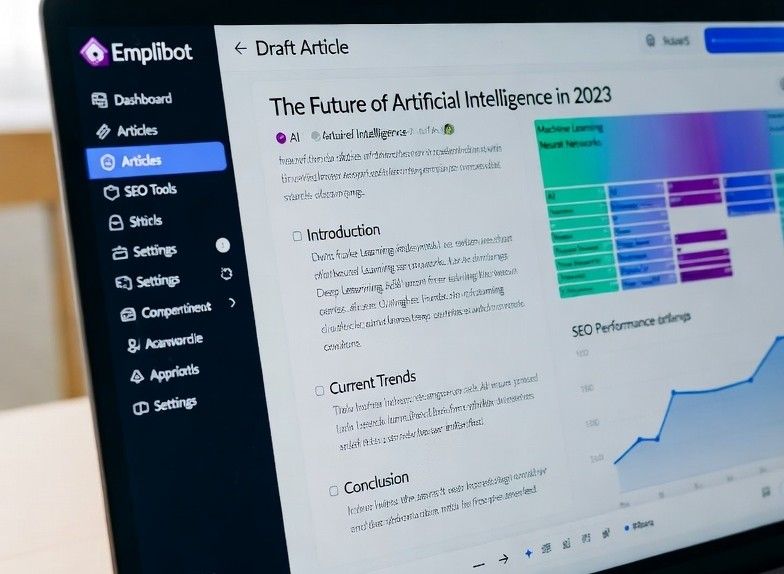Automation Meets Information: How Emplibot Is Reshaping the Tech News Cycle

Tech news breaks every minute. Reporters chase stories across the web, fact-check details, and craft updates before competitors do. Speed wins attention in this fast world. Yet, quality matters too. Readers demand accurate, engaging content that ranks high on search engines. Enter AI tools like Emplibot. This platform speeds up the process without sacrificing depth.
Traditional newsrooms face tight deadlines. Editors sift through emails and social feeds for leads. Writers draft pieces, then optimize for SEO. It all takes hours, sometimes days. Tools change that. For instance, blog post software automates much of the grunt work. Emplibot scans sources, generates drafts, and suggests keywords. News outlets using similar tech cut production time by half, according to industry reports from the Associated Press.
Emplibot’s Core Features for Faster Publishing
Emplibot starts with smart research. It pulls real-time data from reliable sites. No more manual browsing. The AI analyzes trends, like a new gadget launch or software update. Then, it builds a structured outline. Writers review and add voice. This keeps stories fresh and on-point.
- Keyword Integration: Emplibot identifies high-search terms early. It ensures headlines and body text align with what readers type into Google.
- Content Generation: Drafts come SEO-ready. Sentences flow naturally, with headings and lists for easy reading.
- Visual Aids: The tool creates infographics and images. These boost engagement and dwell time on pages.
One editor at a mid-sized tech site shared her take. “Before Emplibot, we’d spend mornings just on research,” she said. “Now, we focus on analysis. Our updates go live in under an hour.” Her team covers AI breakthroughs without burnout. Such efficiency lets small outlets compete with giants.
Balancing Speed with Relevance in Tech Reporting
Relevance defines good news. AI helps here too. Emplibot cross-checks facts against multiple sources. It flags biases or outdated info. Writers refine the output, ensuring the piece resonates with audiences. For tech news, this means explaining complex topics simply. Think quantum computing or blockchain updates. The AI handles jargon; humans add context.
Consider a recent example. When Apple unveiled its latest AI chip, outlets using Emplibot published breakdowns within minutes. They included benchmarks, user impacts, and future implications. Readers stayed longer because the content felt tailored. Not generic summaries, but insightful guides.
- Audience Targeting: The platform learns from past posts. It suggests angles that match reader interests, like developer tips or consumer reviews.
- Fact-Checking Layer: Built-in verification pulls from trusted databases. This cuts errors that erode trust.
- Personalization: Each article adapts tone. Formal for B2B sites, casual for gadget blogs.
But does speed compromise ethics? Experts say no, if used right. “AI amplifies human strengths,” notes a Columbia Journalism Review report. It handles volume; journalists chase nuance. Emplibot shines in this balance. It generates, but never publishes without approval.
SEO Strategies Powered by AI
Search engines favor fresh, optimized content. Emplibot embeds SEO from the start. It researches long-tail keywords, like “best AI tools for news 2025.” Meta descriptions get crafted automatically. Internal links connect to related stories, boosting site authority. For teams on a budget, exploring affordable shared SEO toolkit access can further amplify these gains by pooling resources for premium analytics.
Results show up quick. Sites report 30% traffic jumps post-adoption. Google loves structured data, and Emplibot adds schema markup seamlessly. No tech headaches for writers. Plus, it tracks performance. Low-ranking posts trigger revisions with better keywords.
“Emplibot turned our blog into a lead machine,” raves a tech publisher. “SEO feels effortless now. We rank for terms we never targeted before.”
Challenges and the Human Touch
AI isn’t perfect yet. It can miss subtle cultural cues in stories. Tech news often involves global angles, like EU regulations on data privacy. Here, human oversight shines. Emplibot drafts; editors polish for accuracy and empathy.
Training matters too. News teams need workshops on prompting AI effectively. “Prompt like you write,” advises one trainer. Specific inputs yield better outputs. Over time, this builds sharper tools.
- Integration Hurdles: Linking to CMS like WordPress takes setup. But once done, publishing clicks one button.
- Cost Benefits: Starts affordable, scales with use. Small outlets save thousands in freelance fees.
- Future-Proofing: Updates include voice search optimization. As tech evolves, so does Emplibot.
Real-World Wins from Tech Outlets
Gadgets Weekly adopted Emplibot last year. Their cycle shrank from days to hours. A piece on foldable phones hit top search spots overnight. Traffic soared 45%. Writers credit the tool for freeing time on interviews.
Larger players experiment too. The Associated Press uses AI for alerts and summaries. Emplibot fits similar roles, tailored for blogs. “It’s like having an extra staffer,” says their innovation lead.
What about scalability? Yes! From solo bloggers to teams, it adapts. Schedule posts weeks ahead. Let AI handle peaks, like CES coverage.
The Road Ahead for AI in News
Emplibot leads a quiet revolution. It proves AI and journalism coexist. Faster updates draw readers. Relevant stories build loyalty. SEO smarts drive growth. As tools improve, expect more innovation. Voice assistants might read articles aloud, scripted by AI.
One thing stays constant. Human curiosity fuels it all. Emplibot empowers that spark. Tech news cycles spin quicker, but wiser. Outlets thrive when automation meets insight. The future looks bright, efficient, and engaging.

 Search engine optimization has become one of the most essential parts of digital marketing strategies worldwide. Companies of all sizes, from startups to established agencies, are investing heavily in SEO tools to track performance, analyze competitors, and manage keyword research. However, the high cost of individual subscriptions has pushed many businesses to explore new cost-effective solutions. One of the latest trends making headlines in the tech industry is SEO toolkit group access, a model that lets users share premium tool subscriptions at a fraction of the usual price.
Search engine optimization has become one of the most essential parts of digital marketing strategies worldwide. Companies of all sizes, from startups to established agencies, are investing heavily in SEO tools to track performance, analyze competitors, and manage keyword research. However, the high cost of individual subscriptions has pushed many businesses to explore new cost-effective solutions. One of the latest trends making headlines in the tech industry is SEO toolkit group access, a model that lets users share premium tool subscriptions at a fraction of the usual price.
 Unfortunately, not all SMM panels use encryption or other security precautions while collecting personal information. Some of these panels ask for social media login credentials, email addresses, and even payment details. Because of this, phishing and identity theft are possible.
Unfortunately, not all SMM panels use encryption or other security precautions while collecting personal information. Some of these panels ask for social media login credentials, email addresses, and even payment details. Because of this, phishing and identity theft are possible.
 Microsoft designed Windows 10 Pro with business security in mind. One of its standout features is BitLocker, which encrypts entire drives, keeping sensitive business data safe even if a device is stolen or lost. Without a legitimate license, businesses risk losing access to this powerful protection.
Microsoft designed Windows 10 Pro with business security in mind. One of its standout features is BitLocker, which encrypts entire drives, keeping sensitive business data safe even if a device is stolen or lost. Without a legitimate license, businesses risk losing access to this powerful protection. Artificial Intelligence (AI) is reshaping how we engage on social media. AI-powered social media management (SMM) tools have become essential for businesses and influencers, from automating posts to generating insights into audience behavior. These advancements are designed to make managing online presence easier, quicker, and more effective. AI-driven tools like those offered by SMM World (https://www.smm-world.dk) are making it possible to automate engagement and target audiences more precisely than ever.
Artificial Intelligence (AI) is reshaping how we engage on social media. AI-powered social media management (SMM) tools have become essential for businesses and influencers, from automating posts to generating insights into audience behavior. These advancements are designed to make managing online presence easier, quicker, and more effective. AI-driven tools like those offered by SMM World (https://www.smm-world.dk) are making it possible to automate engagement and target audiences more precisely than ever.











